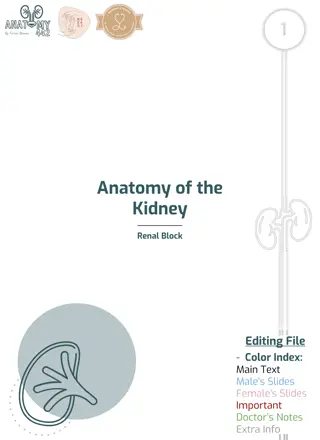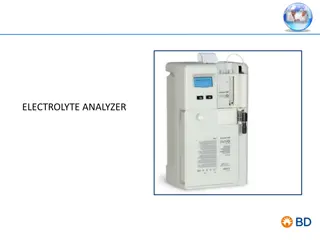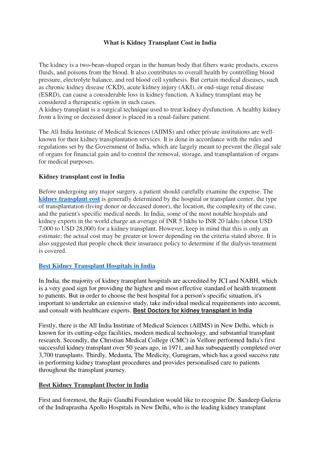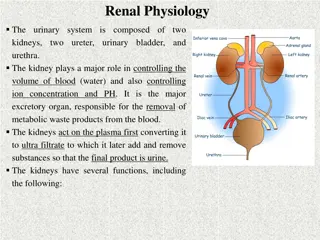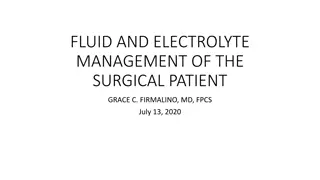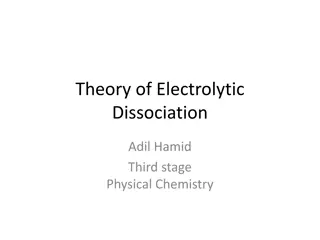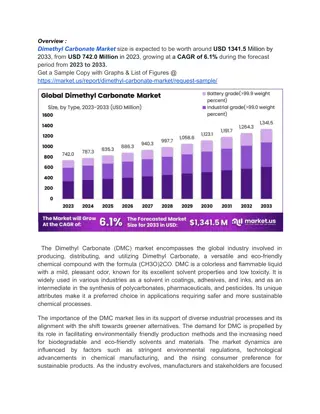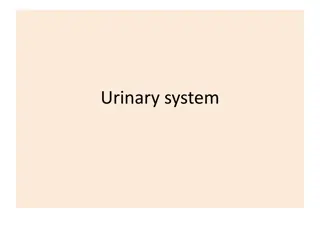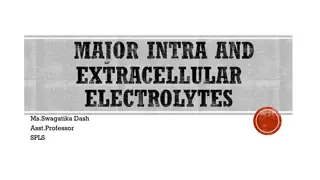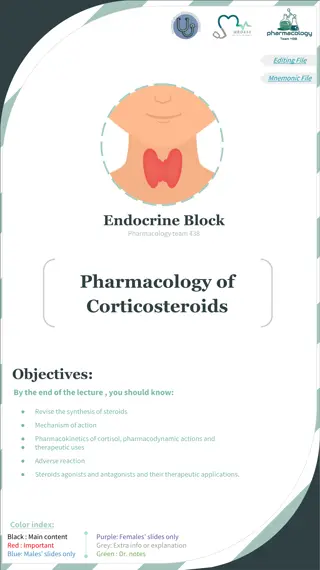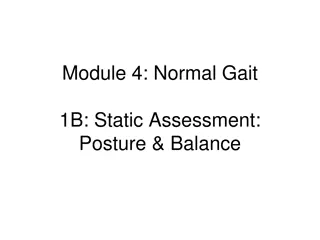Electrolyte and Metabolic Disturbances in the Critically Ill
Dr. Srilekha Ammapalli discusses the cations (sodium, potassium, calcium, magnesium) and anions (chloride, bicarbonate, phosphate, lactate) involved in electrolyte and metabolic disturbances in critically ill patients. The physiology, causes of abnormalities, diagnosis, evaluation, and management of
2 views • 104 slides
Anatomy of the Kidney: Essential Features and Functions
The kidneys play a vital role in filtering waste products, regulating electrolyte balance, maintaining blood pH, producing hormones, and more. This article explores the anatomical features of the kidneys, including their position, extent, internal structure, vascular segments, and coverings. It also
0 views • 16 slides
Understanding Electrolyte Analyzers in Medical Settings
Electrolyte analyzers play a crucial role in monitoring electrolyte levels for patients in various medical scenarios, including emergency departments, ICU admissions, and those with liver and kidney disorders. This technology utilizes Flame Emission Photometry and Ion Selective Electrode (ISE) techn
5 views • 6 slides
TOP 10 COMPANIES IN ELECTROLYZERS MARKET
Hydrogen is either stored as a compressed gas or liquefied, and since hydrogen is an energy carrier, it is used to power any hydrogen fuel cell electric application such as trains, buses, trucks, or data centers. The three main types of electrolyzers are proton exchange membrane (PEM), alkaline, and
3 views • 3 slides
Kidney Transplant Cost in India
The kidney is a two-bean-shaped organ in the human body that filters waste products, excess fluids, and poisons from the blood. It also contributes to overall health by controlling blood pressure, electrolyte balance, and red blood cell synthesis. But certain medical diseases, such as chronic kidney
10 views • 2 slides
What is kidney transplant cost in India
The kidney is a two-bean-shaped organ in the human body that filters waste products, excess fluids, and poisons from the blood. It also contributes to overall health by controlling blood pressure, electrolyte balance, and red blood cell synthesis. Bu
0 views • 2 slides
Essential Overview of Gastrointestinal Physiology
Exploring the organization and general principles of gastrointestinal physiology, this content covers the anatomical and functional aspects of the GI system, including smooth muscle characteristics, neural control, blood flow, nutrient absorption, waste excretion, and regulatory functions like immun
0 views • 46 slides
Understanding Electrolysis and Copper Processing
Electrolysis is a process that uses an electrical current to move ions in an electrolyte solution. In the processing of copper ores, electrolysis plays a vital role. Copper ions leave the anode and move towards the cathode in a copper electrolysis setup. This experiment involves using a penny as the
1 views • 27 slides
Understanding Acid-Base Balance in Health and Disease
Many critical illnesses can disrupt acid-base balance, indicating underlying diseases or organ damage. Interpretation of disturbances requires analyzing arterial blood gases, plasma electrolytes, and compensatory mechanisms. Acid-base disorders are classified into respiratory acidosis, respiratory a
3 views • 26 slides
Understanding Off-Balance Sheet Items in Banking Activities
Off-balance sheet items refer to activities that are assets or liabilities of a company but do not appear on the balance sheet. In banking, these can include loans given to borrowers, securitization, guarantees, and other contingent facilities. Learn more about how off-balance sheet exposures impact
0 views • 6 slides
Understanding Renal Physiology: The Role of the Kidneys in Maintaining Homeostasis
The urinary system consists of the kidneys, ureters, urinary bladder, and urethra, playing a crucial role in regulating blood volume, ion concentration, and pH. The kidneys, as the major excretory organ, remove metabolic waste products and help maintain water-electrolyte balance, regulate arterial p
0 views • 27 slides
Understanding Fluids and Electrolytes in Clinical Practice
This educational material by Dr. Emily Miller provides a comprehensive overview of major electrolytes, common fluid and electrolyte issues in the PICU, including causes and treatment of hyponatremia and hypernatremia. It also includes multiple-choice questions to test knowledge on the topic. The con
2 views • 31 slides
Understanding Electrolytes and Their Imbalances: Essential Information
Electrolytes are crucial chemicals that regulate various bodily functions, including nerve and muscle activity, hydration, and tissue repair. Imbalances in electrolyte levels can arise from various factors and conditions such as congestive heart failure, diabetes, dehydration, and intense physical a
0 views • 20 slides
Understanding Fluid and Electrolyte Management in Surgical Patients
This article delves into the intricacies of fluid and electrolyte management in surgical patients, covering topics such as total body water distribution, fluid compartments, electrolyte composition, body fluid changes, and disturbances in volume, concentration, and composition. It explores the fluid
0 views • 25 slides
Theories of Electrolytic Dissociation and Ionization in Physical Chemistry
The theories of electrolytic dissociation by Adil Hamid and Arrhenius explain how electrolytes dissociate into ions in solution, leading to electrical conductivity. This process involves the migration of cations and anions towards opposite electrodes, affecting the conductivity of the electrolyte. T
1 views • 51 slides
Understanding Pharmacology of Corticosteroids by Dr. Saeed Ahmed
Corticosteroids are steroid hormones produced by the adrenal cortex, classified into glucocorticoids and mineralocorticoids. Glucocorticoids have diverse effects on metabolism, immune responses, and inflammation, whereas mineralocorticoids regulate electrolyte balance. Mechanistically, corticosteroi
1 views • 32 slides
Laboratory Equipment E-Catalog 2019
Explore the E-Catalog featuring various laboratory equipment such as the Analyticon Biolyzer 100 Chemistry Analyzer, Boeco Centrifuge C28A, and Eschweiler Blood Gas Analyzer. View specifications, prices, education materials, and procedures for these advanced laboratory tools. The catalog includes es
2 views • 7 slides
Industrial Applications Propel Power Transformer Market Growth
Dimethyl Carbonate Market By Grade(Industry Grade, Pharmaceutical Grade, Battery Grade), By Application(Polycarbonate Synthesis, Battery Electrolyte, Solvents, Reagents, Others), By End-use(Plastics, Paints & Coating, Pharmaceutical, Battery, Agrochemicals, Others), By Sales Channel(Direct Sales, In
0 views • 4 slides
Understanding Parenteral Fluid Therapy and IV Solutions
This informative content explores the essentials of parental fluids therapy, including the indications, types of IV solutions (isotonic, hypotonic, hypertonic), and categories of intravenous solutions based on their purpose. It covers the significance of IV solutions containing dextrose or electroly
0 views • 37 slides
Understanding Electrolytes in Chemical Solutions and Their Importance in Body Fluid Balance
Chemical compounds in solution can remain intact or dissociate into ions, affecting their electrical charge. Electrolytes like sodium chloride play a crucial role in body fluid balance and acid-base regulation. Electrolyte preparations are used to treat imbalances, with milliequivalents and molar co
1 views • 32 slides
Understanding the Urinary System: Kidneys, Functions, and Structure
The urinary system, also known as the renal system, consists of the kidneys, ureters, bladder, and urethra. Each kidney contains nephrons, the functional units responsible for filtering waste and regulating blood volume, pressure, electrolytes, and pH balance. The kidneys have an extensive blood sup
0 views • 35 slides
Role of Major Physiological Anions in the Human Body
Physiological anions such as chlorides, sulphates, bicarbonate, phosphates, and electrolytes play essential roles in maintaining various functions within the body. Chloride ions help in osmotic balance, charge balance, and acid-base balance. Sulphates are important for detoxification mechanisms and
0 views • 11 slides
Understanding Major Intra and Extracellular Electrolytes in Body Fluids
Body fluids contain various electrolytes crucial for maintaining cell and tissue environments. Electrolyte balance is essential for overall health, and external electrolyte replacement therapy may be necessary in certain conditions. The body's fluid compartments - intracellular, interstitial, and pl
0 views • 10 slides
Pharmacology of Corticosteroids: Synthesis, Mechanism of Action, and Therapeutic Uses
Corticosteroids are steroid hormones produced by the adrenal cortex, divided into glucocorticoids and mineralocorticoids. They play crucial roles in metabolism, immunity, inflammation, and electrolyte balance. Glucocorticoids like cortisol stimulate gluconeogenesis, influence glucose levels, and hav
0 views • 9 slides
Understanding Electrolytes in Chemical Solutions
The content discusses the concept of electrolytes in chemical compounds, exploring how they can remain intact or dissociate into ions in solution. It explains the roles of electrolytes in body fluids, their movement in the presence of electrodes, and the use of electrolyte preparations in clinical p
3 views • 25 slides
Understanding the Biochemistry of Addison's Disease in the Endocrine System
Addison's Disease, a primary adrenocortical hypofunction, involves the adrenal gland's cortex and its hormone synthesis. The condition affects aldosterone and cortisol production, impacting electrolyte balance and blood pressure regulation. Learn about the anatomical and histological aspects of the
0 views • 21 slides
Understanding Water and Electrolyte Balance in the Human Body
The body's fluid compartments, including intracellular and extracellular fluids, play a crucial role in maintaining water and electrolyte balance. This balance is regulated by movements of water and electrolytes between compartments, influenced by factors like hydrostatic and osmotic pressures. Main
2 views • 18 slides
Understanding Fund Balance in School Finance
Explore the concept of fund balance in school finance through examples from Bozeman Schools. Learn how beginning balance, revenues, and expenditures affect the ending fund balance, with a system designed to maintain reserves. Delve into budgeting and actual expenditure scenarios to better comprehend
0 views • 24 slides
Local Government Finance Overview - Fiscal Year 2024/2025 Budget Insights
Explore the Fiscal Year 2024/2025 Budget details including Fund Balance, Revenue sources, Importance of a Strong Fund Balance, Fund Balance Policies, various Funds available, Revenues breakdown by types, and Actuals data for the year 2022/2023. Understand the significance of maintaining a strong Fun
0 views • 27 slides
Understanding Posture, Balance, and Gait Analysis in Human Movement
This resource delves into the static assessment of posture and balance, exploring the various inputs and control mechanisms involved in maintaining standing posture. It discusses the key factors influencing posture, such as visual, somatosensory, proprioceptive, and vestibular systems, along with mu
0 views • 51 slides
Understanding Balance of Payment (BOP) and Its Components
Balance of Payments (BOP) is a crucial accounting record detailing a country's economic transactions with the rest of the world. It encompasses exports, imports, financial transfers, and more. The BOP consists of the Current Account Balance, Capital Account Balance, and Overall BOP, reflecting the f
0 views • 17 slides
Understanding Balance of Power in 18th Century Europe
Balance of power in 18th-century Europe was a concept where great powers aimed to maintain equilibrium to prevent one nation from becoming too powerful. This balance was evident in events like the War of the Austrian Succession and the Diplomatic Revolution of 1756, which reshaped alliances and riva
0 views • 13 slides
Understanding Electrolytes and Their Importance for Trail Equine Athletes
Explore the crucial role of electrolytes for competitive trail equine athletes, including their functions, absorption in the body, sources of loss, and homemade electrolyte formulations. Learn how electrolytes such as sodium, potassium, and chloride are essential for muscle function, intestinal moti
0 views • 22 slides
Pediatric Surgery: Special Considerations for Venous Access and Fluid Management
Pediatric surgery requires special attention to venous access and fluid management due to unique considerations in infants and children. Key aspects include methods for obtaining vascular access, monitoring fluid and electrolyte balance, and addressing specific fluid requirements based on age and we
0 views • 15 slides
Understanding Intravenous Fluid Resuscitation and Blood Transfusion in Clinical Practice
Intravenous fluid resuscitation and blood transfusion are crucial components of patient care, involving the direct administration of fluids and electrolytes to maintain proper fluid balance. When calculating the volume of fluid to be replaced, various factors must be considered, including maintenanc
0 views • 15 slides
Understanding Alterations in Genitourinary Function: An Overview
The genitourinary system comprises the urinary and reproductive organs, with the kidneys, ureters, bladder, and urethra playing crucial roles. Maintaining proper function involves factors like renal blood flow, glomerular filtration, tubular function, and urine flow. Nephrons are the functional unit
0 views • 58 slides
Understanding Electrolyte Activity Coefficients and Equilibrium Constants
This article delves into the practical aspects of dealing with individual ions in aqueous solutions, particularly focusing on partitioning thermodynamic parameters between ions in salts. It explores the Debye-Hückel theory, which explains the electrostatic interactions between ions in solution and
0 views • 20 slides
Understanding Earth's Energy Balance and Temperature Variations
Earth's energy balance is crucial for maintaining atmospheric temperature and regulating daily and seasonal temperature changes. The net radiation, consisting of incoming shortwave and outgoing longwave radiation, plays a key role in this balance. Components such as sensible heat flux, latent heat o
0 views • 18 slides
Overview of the Urinary System and Kidney Function
The urinary system, also known as the renal system, includes the kidneys, ureters, bladder, and urethra. Its main functions are waste elimination, blood volume regulation, electrolyte control, and pH regulation. The kidneys, bean-shaped organs with a complex structure, filter blood to produce urine.
0 views • 35 slides
Understanding Renal Physiology and Functions
This content covers the aims of studying renal physiology, functions of the kidney, basic renal processes, renal secretion, urine formation, and types of renal failure. It delves into topics such as water balance, electrolyte balance, urine production, and the components of the urinary system. The i
0 views • 10 slides

